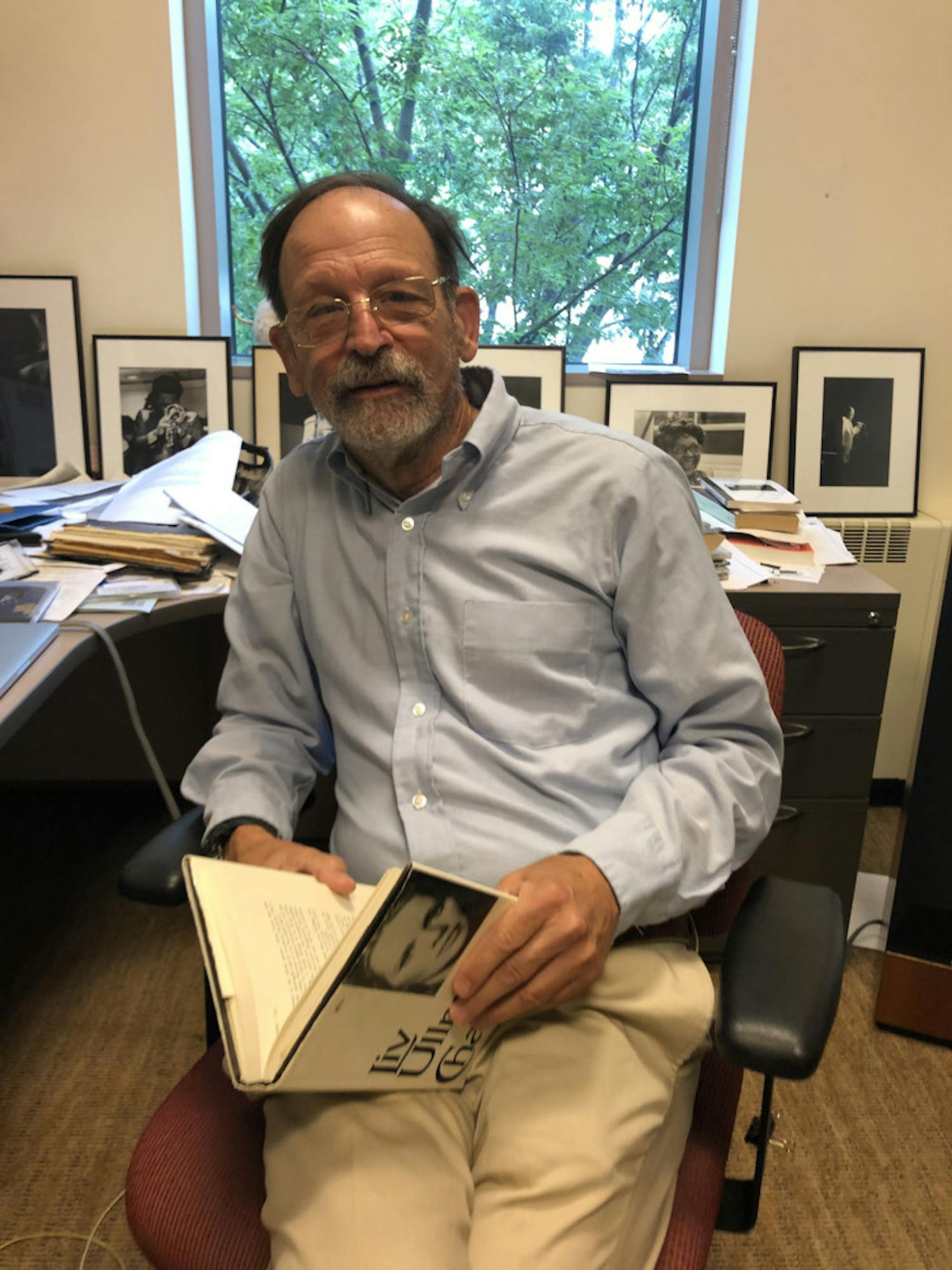Few people know Tufts as well as Michael Ullman, senior lecturer of English and music, who expects to retire soon. Ullman spent much of his childhood exploring the Medford/Somerville campus, as his father started working as a professor of sociology at Tufts in 1946, one year afterUllman was born. To this day, Ullman proudly keeps a plaque of his father’s first Tufts contract on his desk in the Granoff Music Center.
“I more or less grew up here,” Ullman said. “My parents lived in what’s now the Humanities Center for some years. When I was a kid, this whole street, Professors Row, was little tiny houses inhabited by professors.”
Ullman first came to Tufts as a professor 45 years ago in 1976.
“I had a three-year visiting assistant professorship at [Boston College], and then I was just looking around, and Tufts needed a nonfiction writer … I looked in the catalog and they had this thing called nonfiction writing, which no one had taught in years, so I revived it."
Ever since he was a child, Ullman knew he was interested in music and literature, and he feels grateful that he has been able to work at the intersection of those two passions throughout his career.
“The two things I always wanted to do was read and listen to music, so you could call it pure egotism that I wanted to do both things,” Ullman said.
One of the first times Ullman found himself professionally intertwining his interests in English and music was through writing an article about jazz for Boston Magazine.
“I was at a party and I met an editor at Boston Magazine… I said, ‘You never write anything about jazz … would you like me to write an article about jazz?’ He said, ‘Okay, take it on spec,’ which means they don’t pay you if they don't publish it, and he really liked it, and it was published.”
The success of that article prompted the editor of theNew Boston Review, now the Boston Review, to call Ullman, asking if Ullman would write a series of articles. Within a year, Ullman was writing his own column called Michael Ullman and Jazzin the The New Republic.
“Honestly, that part of my career was just so easy that it seems astonishing to me now,” Ullman said. “So they hired me here [at Tufts] on the basis of my column in The New Republic, I think.”
Ullman noted that one major moment in his career was when he was working at Tufts but was offered a job at The Boston Globe.
“The turning point in my career is literally when I was being paid part-time [at Tufts], and I had an offer at The Boston Globe to be their jazz critic, and they were to pay me twice what they were here, so I went to the deans and the provost, and that’s when they made me full time in order to keep me,” Ullman said.
Ullman has worked at Tufts ever since and has cherished his many years spent in the classroom with students.
“It’s very stimulating to me, to meet new people, the challenge of meeting new people, the challenge of communicating with them,” Ullman said. “What a joy really — I get a whole bunch of kids together and I talk about what I’m interested in.”
According to Ullman, one of his most unforgettable moments as a professor was a specific question asked by one of his students several decades ago regarding why Ullman was teaching jazz.
“In one of my first classes, a young African American kid — we later became good friends — raised his hand and said, ‘How are you teaching this class? You’re a white person?’ People shuddered... But I thought it was a really good question, and if I don’t have an answer to it, I shouldn’t be teaching,” Ullman said.
Ullman addressed the student’s question by using an example about a singer the class had just been talking about.
“So I said, ‘You know, we were just listening to Bessie Smith’ — who’s a blues singer from the ‘20s — and I say, ‘She’s a woman. You’re a man. How could you possibly understand what she is going through in the ‘20s?'" Ullman said. "I think I do what you do, which is I’ve interviewed hundreds — literally hundreds — of musicians, and I listen to what they say. I read everything I can that’s written. I listen, and for the rest of it, I use my imagination, and I think that’s what you do."
More than 40 years after that interaction, Ullman finds himself sad to end his time at Tufts but looks forward to having more time to spend writing a 16-page article for Fanfare every other month and hanging out with his grandkids when they are not in school. He hopes, if nothing else, that his students remember him by his kindness.
“Every year they interview seniors, and of course, I wish people would say, 'Oh he’s life changing…' But I remember one year, three kids in a row said, ‘He’s the kindest person at Tufts,’ so I thought that, okay, that’s good,” Ullman said. “Maybe I don’t change their lives intellectually, but at least I was kind.”
Looking back, Ullman acknowledges how appreciative he is of the uniqueness of his job as well as the Tufts community.
“I’m just very grateful for a very unusual job," Ullman said. "There is no other job like mine in the country. As a kid, I wanted to do two things, and I’ve been able to do it, and not a lot of people can say that. And I do it at a place where students are smart and engaged. It’s just been a joy.”






